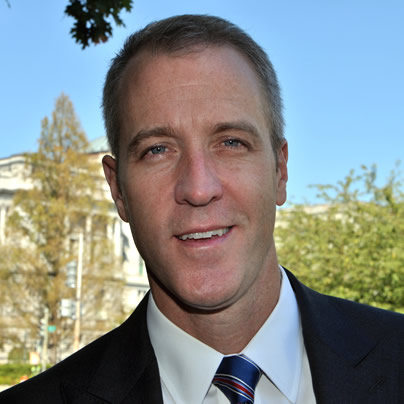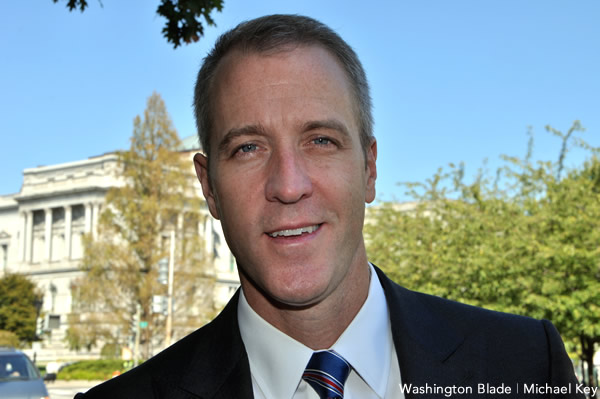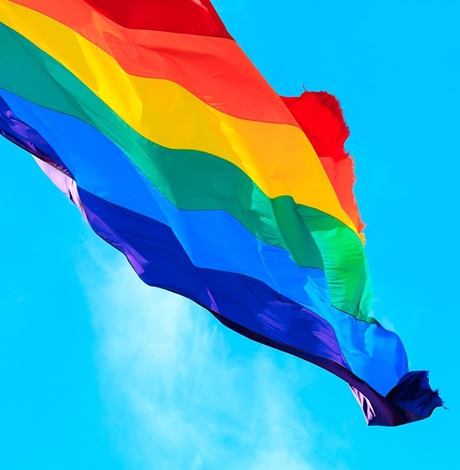National
Election Day brings more out gays to Congress
But balance of power will likely prevent action on LGBT bills


Sean Patrick Maloney was among the openly gay people elected to Congress (Washington Blade file photo by Michael Key)
The results on Election Day were hailed as a milestone as a record number of openly LGBT people were elected to Congress, although prospects for the passage of pro-LGBT legislation next year don’t look promising.
In addition to re-electing President Obama and approving the marriage equality side on ballot initiatives in four states, voters elected at least six openly LGB lawmakers to Congress in addition to electing pro-LGBT lawmakers like Elizabeth Warren in Massachusetts and Sherrod Brown in Ohio.
Tammy Baldwin made history by becoming the first openly gay person elected to the U.S. Senate (see related story) as incumbent Reps. Jared Polis (D-Colo.) and David Cicilline (D-R.I.) were re-elected. Joining them will be Sean Patrick Maloney, who’ll be the first openly gay congressman from New York; Mark Pocan, who’ll occupy the seat Baldwin held in the House; and Mark Takano, a California Democrat who’ll be the first openly gay person of color elected to Congresss.
As of press time, the race to represent Arizona’s 9th congressional district between bisexual Democratic candidate Kyrsten Sinema and Republican Vernon Parker wasn’t yet called. However, Sinema maintained a slim lead in the votes that were already tabulated. If elected, Sinema would be the first bisexual member of Congress.
Chuck Wolfe, CEO of the Gay & Lesbian Victory Fund, acknowledged the night resulted in historic wins in terms of LGBT representation at the federal level of U.S. government.
“It’s without a doubt historic,” Wolfe said. “I think you can talk about the fact that it was history-making, and those that won will be making history for years to come.”
The election results means Congress will look very different in terms of LGBT representation in the wake of Rep. Barney Frank’s (D-Mass.) retirement and Baldwin leaving the House for the Senate. The results also mean that number of openly gay House members will go from four to at least six.
Gay candidates who didn’t win were Republican Richard Tisei, who lost his bid to unseat pro-LGBT Rep. John Tierney (D-Mass.), and lesbian Democrat Nicole LaFavour, who lost her bid to unseat Rep. Mike Simpson (R-Idaho). LaFavour wasn’t endorsed by the Victory Fund.
Despite the excitement, the Election Day results in some respects resulted in the status quo for the legislative and executive branch of the U.S. government from what existed after the 2010 election when no pro-LGBT legislation passed Congress. Democrats retained control of the White House and the Senate, while Republican remain in control of the House.
As of press time, the Senate was poised to have 54 senators caucus with the Democrats and 45 senators caucus with the Republicans, although the Senate race in North Dakota remained too close to call. That would mean a net gain of one Democrat in the Senate. In the House, Republicans retained control of the chamber, but had a slimmer majority of 232 seats while Democrats claimed 191 seats — with 12 races being too close to call.
Chad Griffin, president of the Human Rights Campaign, acknowledged in a conference call with reporters on Wednesday that these results still mean a pro-LGBT majority doesn’t exist in Congress, making the passage of favorable legislation difficult.
On the issue of federal workplace non-discrimination protections, which remain an outstanding issue for the LGBT community, Griffin said in response to a question from the Washington Blade the votes won’t be there to pass legislation known as the Employment Non-Discrimination Act.
“We need to acknowledge that although we certainly made some gains in the Senate, and potentially some gains in the House, we are still short of having a vote for an inclusive ENDA in the House,” Griffin said. “We need to be realistic about that.”
Griffin said “more successes could be seen” on the state and local level and called on the White House to revisit the idea of an executive order barring federal contractors from discriminating against LGBT people, which it said in April it wouldn’t issue at the time.
“It is my hope and belief that we can get an executive order out of this White House,” Griffin said. “It is something that should be done and we will continue to urge our newly re-elected president to do. That would not be the full solution, but it would be a step toward the end goal.”
Tico Almeida, president of Freedom to Work and one of the leading advocates of the executive order, also said it’s time for the White House to reconsider to its decision in the wake of the Election Day results.
“Yesterday was a turning point for our LGBT movement and President Obama has proven that elected officials can stand strongly on the side of LGBT fairness without fear of voter backlash,” Almeida said. “We will continue to push for the president to sign the executive order as soon as possible because every day that passes is another day in which taxpayer money can be squandered on anti-LGBT workplace harassment and discrimination.”
Asked whether the White House would revisit this idea, Shin Inouye, a White House spokesperson said, “I have no updates for you on that issue.”
Almeida also said action could be seen in the Senate to pass ENDA and called for a hearing, mark-up, and full Senate vote in 2013 when lawmakers convene at the start of the next Congress.
“One lesson from recent LGBT advocacy efforts is that we should not wait until the second year of a congressional session to move legislation forward because that’s when some elected officials start getting nervous about the upcoming election and the legislative clock starts to run out of legislative days,” Almeida said.
In the addition to workplace non-discrimination protections, action could be done at the federal level to repeal the Defense of Marriage Act, which prohibits federal recognition of same-sex marriage. Griffin said during the conference call HRC would “continue to push forward” in Congress, but expressed skepticism about passage of any legislation.
“We do have to remember the leadership in the House of Representatives is not a pro-equality set of leaders, so we still have a lot of work to do there, but I can believe we can continue this momentum,” Griffin said.
Griffin placed greater emphasis action from the Supreme Court, which on Nov. 2o will determine whether it will take up litigation challenging California’s Proposition 8 and Section 3 of DOMA. If the court declines to hear the Prop 8 case, it would mean same-sex marriage would almost immediately return to California.
Another question is which states will advance pro-LGBT legislation or relationship recognition bills in the wake of the Election Day results. Griffin said he expects progress there, but said it’s “very early” to determine which states will see action.
Pennsylvania
Malcolm Kenyatta could become the first LGBTQ statewide elected official in Pa.
State lawmaker a prominent Biden-Harris 2024 reelection campaign surrogate

Following his win in the Democratic primary contest on Wednesday, Pennsylvania state Rep. Malcolm Kenyatta, who is running for auditor general, is positioned to potentially become the first openly LGBTQ elected official serving the commonwealth.
In a statement celebrating his victory, LGBTQ+ Victory Fund President Annise Parker said, “Pennsylvanians trust Malcolm Kenyatta to be their watchdog as auditor general because that’s exactly what he’s been as a legislator.”
“LGBTQ+ Victory Fund is all in for Malcolm, because we know he has the experience to win this race and carry on his fight for students, seniors and workers as Pennsylvania’s auditor general,” she said.
Parker added, “LGBTQ+ Americans are severely underrepresented in public office and the numbers are even worse for Black LGBTQ+ representation. I look forward to doing everything I can to mobilize LGBTQ+ Pennsylvanians and our allies to get out and vote for Malcolm this November so we can make history.”
In April 2023, Kenyatta was appointed by the White House to serve as director of the Presidential Advisory Commission on Advancing Educational Equity, Excellence and Economic Opportunity for Black Americans.
He has been an active surrogate in the Biden-Harris 2024 reelection campaign.
The White House
White House debuts action plan targeting pollutants in drinking water
Same-sex couples face higher risk from environmental hazards

Headlining an Earth Day event in Northern Virginia’s Prince William Forest on Monday, President Joe Biden announced the disbursement of $7 billion in new grants for solar projects and warned of his Republican opponent’s plans to roll back the progress his administration has made toward addressing the harms of climate change.
The administration has led more than 500 programs geared toward communities most impacted by health and safety hazards like pollution and extreme weather events.
In a statement to the Washington Blade on Wednesday, Brenda Mallory, chair of the White House Council on Environmental Quality, said, “President Biden is leading the most ambitious climate, conservation, and environmental justice agenda in history — and that means working toward a future where all people can breathe clean air, drink clean water, and live in a healthy community.”
“This Earth Week, the Biden-Harris Administration announced $7 billion in solar energy projects for over 900,000 households in disadvantaged communities while creating hundreds of thousands of clean energy jobs, which are being made more accessible by the American Climate Corps,” she said. “President Biden is delivering on his promise to help protect all communities from the impacts of climate change — including the LGBTQI+ community — and that we leave no community behind as we build an equitable and inclusive clean energy economy for all.”
Recent milestones in the administration’s climate policies include the U.S. Environmental Protection Agency’s issuance on April 10 of legally enforceable standard for detecting and treating drinking water contaminated with polyfluoroalkyl substances.
“This rule sets health safeguards and will require public water systems to monitor and reduce the levels of PFAS in our nation’s drinking water, and notify the public of any exceedances of those levels,” according to a White House fact sheet. “The rule sets drinking water limits for five individual PFAS, including the most frequently found PFOA and PFOS.”
The move is expected to protect 100 million Americans from exposure to the “forever chemicals,” which have been linked to severe health problems including cancers, liver and heart damage, and developmental impacts in children.
An interactive dashboard from the United States Geological Survey shows the concentrations of polyfluoroalkyl substances in tapwater are highest in urban areas with dense populations, including cities like New York and Los Angeles.
During Biden’s tenure, the federal government has launched more than 500 programs that are geared toward investing in the communities most impacted by climate change, whether the harms may arise from chemical pollutants, extreme weather events, or other causes.
New research by the Williams Institute at the UCLA School of Law found that because LGBTQ Americans are likelier to live in coastal areas and densely populated cities, households with same-sex couples are likelier to experience the adverse effects of climate change.
The report notes that previous research, including a study that used “national Census data on same-sex households by census tract combined with data on hazardous air pollutants (HAPs) from the National Air Toxics Assessment” to model “the relationship between same-sex households and risk of cancer and respiratory illness” found “that higher prevalence of same-sex households is associated with higher risks for these diseases.”
“Climate change action plans at federal, state, and local levels, including disaster preparedness, response, and recovery plans, must be inclusive and address the specific needs and vulnerabilities facing LGBT people,” the Williams Institute wrote.
With respect to polyfluoroalkyl substances, the EPA’s adoption of new standards follows other federal actions undertaken during the Biden-Harris administration to protect firefighters and healthcare workers, test for and clean up pollution, and phase out or reduce use of the chemicals in fire suppressants, food packaging, and federal procurement.
Maine
Maine governor signs transgender, abortion sanctuary bill into law
Bomb threats made against lawmakers before measure’s passage

BY ERIN REED | On Tuesday, Maine Gov. Janet Mills signed LD 227, a sanctuary bill that protects transgender and abortion providers and patients from out-of-state prosecution, into law.
With this action, Maine becomes the 16th state to explicitly protect trans and abortion care in state law from prosecution. This follows several bomb threats targeting state legislators after social media attacks from far-right anti-trans influencers such as Riley Gaines and Chaya Raichik of Libs of TikTok.
An earlier version of the bill failed in committee after similar attacks in January. Undeterred, Democrats reconvened and added additional protections to the bill before it was passed into law.
The law is extensive. It asserts that gender-affirming care and reproductive health care are “legal rights” in Maine. It states that criminal and civil actions against providers and patients are not enforceable if the provision or access to that care occurred within Maine’s borders, asserting jurisdiction over those matters.
It bars cooperation with out-of-state subpoenas and arrest warrants for gender-affirming care and abortion that happen within the state. It even protects doctors who provide gender-affirming care and abortion from certain adverse actions by medical boards, malpractice insurance, and other regulating entities, shielding those providers from attempts to economically harm them through out-of-state legislation designed to dissuade them from providing care.
You can see the findings section of the bill here:
The bill also explicitly enshrines the World Professional Association of Transgender Health’s Standards of Care, which have been the target of right-wing disinformation campaigns, into state law for the coverage of trans healthcare:
The bill is said to be necessary due to attempts to prosecute doctors and seek information from patients across state lines. In recent months, attorneys general in other states have attempted to obtain health care data on trans patients who traveled to obtain care. According to the U.S. Senate Finance Committee, attorneys general in Tennessee, Indiana, Missouri, and Texas attempted to obtain detailed medical records “to terrorize transgender teens in their states … opening the door to criminalizing women’s private reproductive health care choices.”
The most blatant of these attempts was from the attorney general of Texas, who, according to the Senate Finance Committee, “sent demands to at least two non-Texas entities.” One of these entities was Seattle Children’s Hospital, which received a letter threatening administrators with arrest unless they sent data on Texas patients traveling to Seattle to obtain gender-affirming care.
Seattle Children’s Hospital settled that case out of court this week, agreeing to withdraw its Texas business registration in return for Texas dropping its investigation. This likely will have no impact on Seattle Children’s Hospital, which has stated it did not treat any youth via telemedicine or in person in Texas; the hospital will be able to continue treating Texas youth who travel outside of Texas to obtain their care. That settlement was likely compelling due to a nearly identical law in Washington that barred out-of-state investigations on trans care obtained solely in the state of Washington.
The bill has faced a rocky road to passage. A similar bill was debated in January, but after coming under intense attack from anti-trans activists who misleadingly called it a “transgender trafficking bill,” the bill was voluntarily withdrawn by its sponsor.
When LD 227 was introduced, it faced even more attacks from Gaines and Libs of TikTok. These attacks were followed by bomb threats that forced the evacuation of the legislature, promising “death to pedophiles” and stating that a bomb would detonate within a few hours in the capitol building.
Despite these threats, legislators strengthened both the abortion and gender-affirming care provisions and pressed forward, passing the bill into law. Provisions found in the new bill include protecting people who “aid and assist” gender-affirming care and abortion, protections against court orders from other states for care obtained in Maine, and even protections against adverse actions by health insurance and malpractice insurance providers, which have been recent targets of out-of-state legislation aimed at financially discouraging doctors from providing gender-affirming care and abortion care even in states where it is legal.
See a few of the extensive health insurance and malpractice provisions here:
Speaking about the bill, Gia Drew, executive director of Equality Maine, said in a statement, “We are thrilled to see LD 227, the shield bill, be signed into law by Gov. Mills. Thanks to our pro equality and pro reproductive choice elected officials who refused to back down in the face of disinformation. This bill couldn’t come into effect at a better time, as more than 40 percent of states across the country have either banned or attempted to block access to reproductive care, which includes abortions, as well as transgender healthcare for minors. Thanks to our coalition partners who worked tirelessly to phone bank, lobby, and get this bill over the finish line to protect community health.”
Destie Hohman Sprague of the Maine Women’s Lobby celebrated the passage of the bill despite threats of violence, saying in a statement, “A gender-just Maine ensures that all Mainers have access to quality health care that supports their mental and physical wellbeing and bodily autonomy, including comprehensive reproductive and gender-affirming care. We celebrate the passage of LD 227, which helps us meet that goal. Still, the patterns of violence and disinformation ahead of the vote reflected the growing connections between misogyny, extremism, and anti-democratic threats and actions. We must continue to advocate for policies that protect bodily autonomy, and push back against extremist rhetoric that threatens our states’ rights and our citizens’ freedoms.”
The decision to pass the legislation comes as the Biden administration released updated HIPAA protections that protect “reproductive health care” from out-of-state prosecutions and investigations.
Although the definition of “reproductive health care” is broad in the new HIPAA regulations, it is uncertain whether they will include gender-affirming care. For at least 16 states, though, gender-affirming care is now explicitly protected by state law and shielded from out-of-state legislation, providing trans people and those seeking abortions with protections as the fight increasingly crosses state lines.
****************************************************************************

Erin Reed is a transgender woman (she/her pronouns) and researcher who tracks anti-LGBTQ+ legislation around the world and helps people become better advocates for their queer family, friends, colleagues, and community. Reed also is a social media consultant and public speaker.
******************************************************************************************
The preceding article was first published at Erin In The Morning and is republished with permission.
-

 State Department2 days ago
State Department2 days agoState Department releases annual human rights report
-

 Maryland4 days ago
Maryland4 days agoJoe Vogel campaign holds ‘Big Gay Canvass Kickoff’
-

 Politics3 days ago
Politics3 days agoSmithsonian staff concerned about future of LGBTQ programming amid GOP scrutiny
-

 The White House1 day ago
The White House1 day agoWhite House debuts action plan targeting pollutants in drinking water













